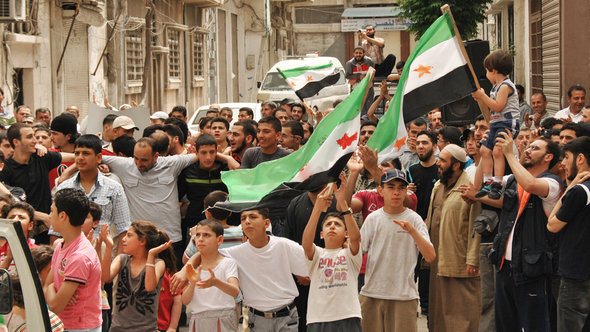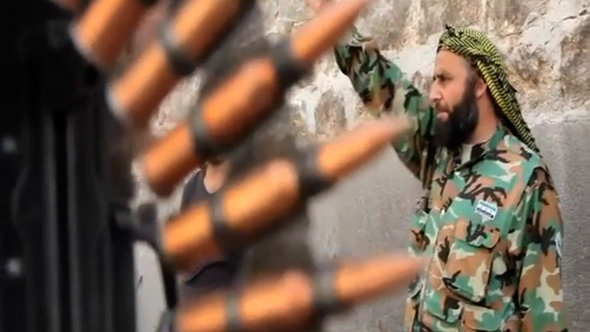The Religious Narrative of Syria's Armed Opposition
What has been the tactic of the armed opposition in Syria so far?
Peter Harling: The armed opposition on the ground has increasingly turned towards their religious narrative as all other narratives failed. The initial narrative was an Arab Spring kind of reference with an ambition to create a vast demonstration that could prove once and for all the illegitimacy of the regime. Repression made sure that that couldn't occur, and so the protesters moved on to a logic of self-defence.
They started to organize – in the face of very vicious and repressive security services – the protection of areas where they could continue to demonstrate. Then they moved on to a logic of a "Free Syrian Army", the ambition being to recreate a national army on the basis of volunteers and defectors from the regime's own military.

There again that option was a failure, and gradually the opposition moved towards an ever more religious and fundamentalist narrative and also towards increasingly violent tactics of their own. We had some large bombings for instance causing considerable casualties among civilians. In some urban areas we've had kidnappings and other kinds of criminal activity cloaked as opposition to the regime. Gradually I think the evolution of the opposition was very much a result of how the regime responded to the initial challenge that the uprising posed.
That evolution has been self-reinforcing. The more Islamist, the more thuggish the opposition became, the fewer people were willing to support it. In fact, in some places its base of support has narrowed to those people who have been subjected to such forms of violence on the part of the regime, that will support anyone fighting it.
Would you say that the opposition or at least parts of the armed opposition have been forced to also accept religiously inspired forces in their rows?
Harling: Basically, the expectation in Syria was that at some stage the international community, given the amount of violence the opposition was being subjected to on the part of the regime, would step in and do something decisive. People on the ground really didn't have an understanding of what the international community could actually do. I think they had this instinct that ultimately they would not be left alone.
And there were many signals from the anti-regime camp within the international community, pushing protestors and later armed groups on the ground to continue to escalate the confrontation with the regime. You had numerous pledges of support but in the end nothing really materialized beyond these empty statements, beyond new rounds of economic sanctions which are affecting the people more than the regime and beyond some support of the armed opposition but which stayed short of providing them the weapons they need to have an edge against the regime, militarily.
So the some states that supported the opposition are responsible to the escalation of violence because they encouraged them to fight the regime but in the end left them out in the cold.
Harling: I think they are not completely responsible. They just played the part in the deterioration of this conflict. Now increasingly, the existence of jihadists and foreign fighters on the ground serves as an excuse for hesitations which have been there all along. In Libya, the West mounted military intervention to oust the regime, not based on the assumption that this society was secular, that no fundamentalist elements within that society would seize the opportunity of western the intervention to push their own agenda. I mean everyone could assume that there would be an issue with jihadism in Libya. And as we have seen recently some of the army or some of the local militia indeed have taken a very fundamentalist stand and got somewhat out of control.

In Syria all those positions which have been taken vis-à-vis the conflict date back to a period of this conflict where jihadists were absent and where fundamentalism was not the issue. Today Russia, Iraq, Iran will point to the existence of jihadi components within the opposition to justify those positions, but those positions go back to a time when the jihadis were not there. I think it's true of the West, too, that we tend to stress or to justify our own hesitations on the basis of this factor. When in fact Syria has always been something of an embarrassment, it's a complicated case. It's a country which is very central to a very volatile and sensitive region, numerous issues tie in to be the Syrian conflict. This simply makes it difficult to mount this kind of instinctive intervention we saw in Libya.
What about the relations between religiously inspired fighters and secular fighters among the armed opposition?
Harling: Essentially it's all the matter of resources. It is a conservative constituency within a Syrian society that has produced the bulk of the fighters – mostly neglected, impoverished, underclass rebels. They tend to be extremely conservative, and as a result that has contributed to shape the character of the armed opposition. But you also have other elements. For instance some minorities involved in the armed opposition. You also have more secular elements which don't have a keen interest in religion but have been moving towards the more Islamist armed groups because they enjoy more support from Islamic networks abroad, in particular in the Gulf.
Basically to carry out this struggle they need weapons, they need ammunition and the money to buy those weapons and the ammunition is coming from some Gulf states, from some Islamic networks organized around mosques for instance. Or from very wealthy Syrian businessmen who are established in the Gulf.
And I think this source of funding from the Gulf has played a role in shaping the identity of the armed opposition in ways which sometimes are extremely opportunistic. People are not necessarily fully convinced by their own discourse and demeanour as fundamentalists. They do it simply because it's a way of catering to their sponsors.
How should the international community deal with Syria, how could the international community help to alleviate the situation on the ground?
Harling: Basically, I think, it's impossible for the time being to broker a dialogue, a negotiation between the two sides on the ground. They are too far apart, there is too much hatred, too much blood has been spilt, and it will take time before we can bring them to sit at the same table. And to do so I think their allies abroad have to start working on how to transform their own partners on the ground. You have a very scattered scene or landscape when it comes to the armed opposition, numerous groups that are more or less forming blocks that are competing with one another. And it would be extremely useful if the anti-regime camp within the international community could coordinate and distribute roles within a shared framework to control the flow of resources to those armed groups and start introducing some structure.
For the time being you have too many groups responding to different sponsors and pushing different agendas. That's very much a resolve of the divisions within the anti-regime camp on the international community. When it comes to the pro-regime camp I think they could do much more to try also to institutionalize this regime which has recruited numerous proxies to carry out its dirty business, which has given a free hand to security services who have engaged in the worst possible behaviour and have committed massacres in some cases for which they have not being held at all accountable and I think there is a need to start reintroducing some discipline within the regime and I think here its allies could apply far more pressure in order for it to do so.
Interview: Kersten Knipp
© Deutsche Welle / Qantara.de 2012
Editor: Lewis Gropp/Qantara.de
